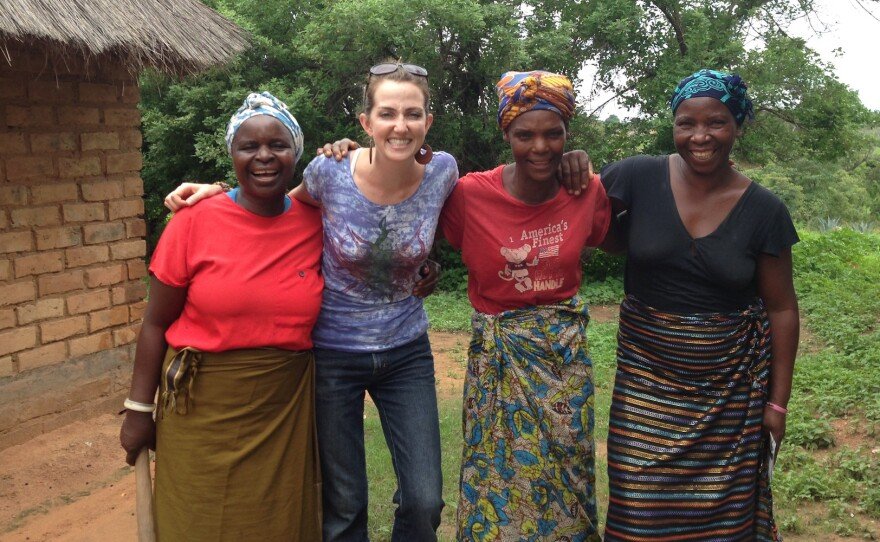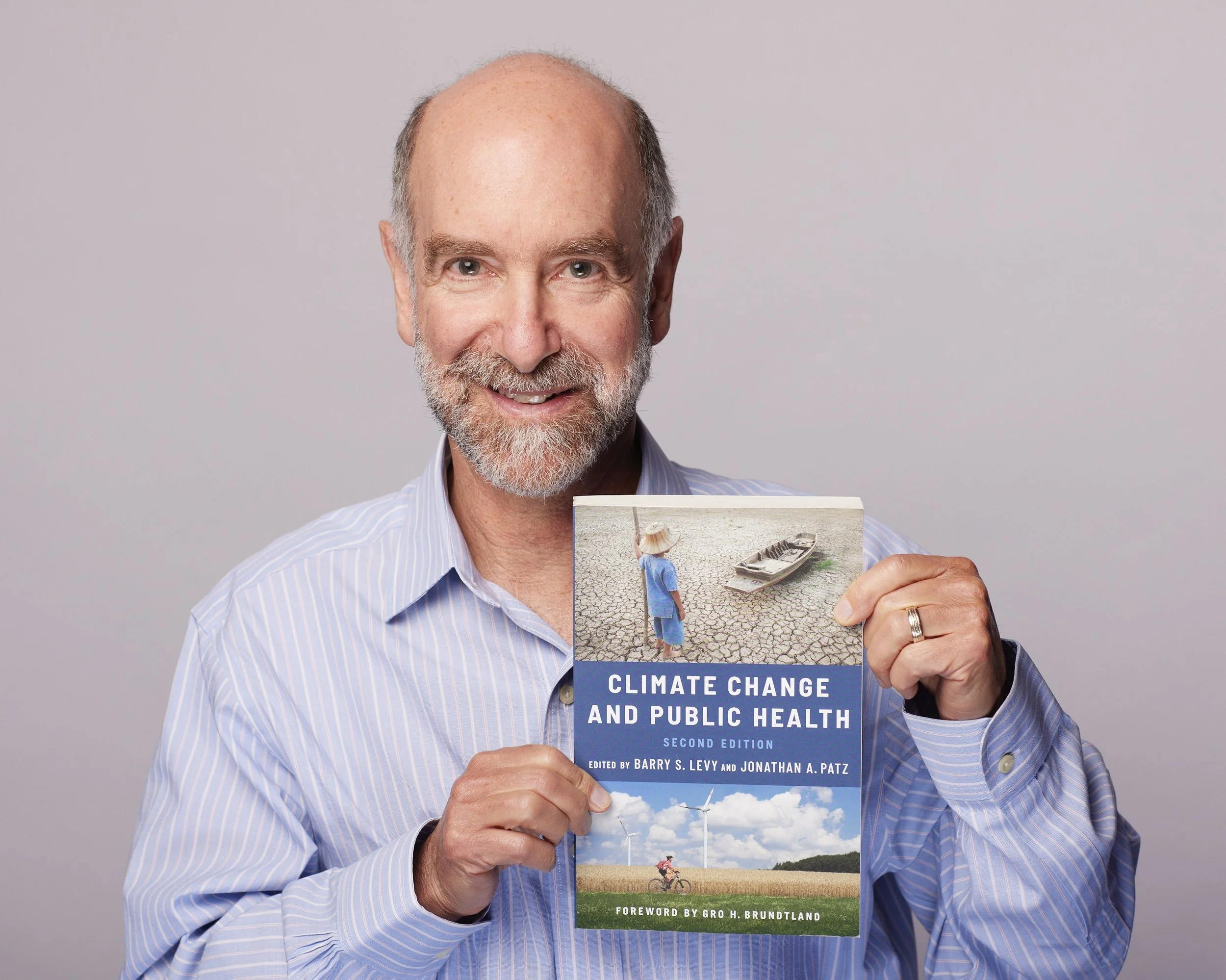Valerie Stull Takes a Holistic View of Food Systems Investigating How to Change Them for the Betterment of the Planet and Communities
Valerie Stull (right) and Rachel Bergmans (left) as graduate students in 2015 studying meal worms as source of protein for human consumption. Photo Credit: Jeff Miller, UW-Madison Photo Library
Creating a More Sustainable and Equitable Food System
Article Author: Michael Kamp, MS
Nelson Institute for Environmental Studies
Overview
The Climate Solutions for Health Lab is lucky to count Dr. Valerie Stull as a member of the team. Stull has dual appointments with SAGE (in the Nelson Institute) as a Research Scientist, as well as in the Department of Community and Environmental Sociology as a Faculty Associate. What does Stull research? “I’m really interested in the intersection of climate change, agriculture, and human health, and looking for ways that we can leverage improved, more regenerative, and climate-smart agriculture for the health of both people and ecosystems.”
Furthermore, Stull is very passionate about food sovereignty, food security, and overall community health. “The goal should be social justice and equity, and I see food access and nutrition as a key piece of that. You can’t have healthy food and nutrition without a healthy environment and healthy agroecosystems,” Stull said. Also, for Stull, ultimately research should translate into tangible action via projects, programs, recommendations, or policy.
Stull has been dedicated to understanding and improving food and nutrition for years now. In undergrad, she majored in both Nutritional Science and English, and her interest deepened during an internship with the United Nations World Food Program (WFP) in Rome where she focused on breaking the cycle of malnutrition. However, during Stull’s time at WFP and work after college, she noticed the need for a more holistic approach and collaboration across disciplines. This led her to complete a Master’s Degree in Public Health (MPH), with a focus on food security and nutrition, and then later a PhD from UW-Madison in Environment and Resources, emphasizing agriculture, nutrition, and climate change.
“I wanted to be a translator across disciplines so to speak. I was much more interested in being an interdisciplinarian than the world’s leading expert in one disease, crop, or one genome, so my work has always been intentionally holistic and applied,” Stull said. Since finishing her PhD, Stull has continued her multifaceted research at UW-Madison. Currently, Stull is concentrating on two main research projects, although she wears many different hats.
Research Projects
First, Stull is a co-leader of the Soil Health and Agroecological Living Lab (SHALL) at UW-Madison. SHALL is part of the broader Soil Health Collaborative – a partnership between the USDA, UW-Madison, and the Michael Fields Agricultural Institute that focuses on how to improve soil health and soil health practices in the Midwest, specifically in Wisconsin.
Generally, soil health in the U.S. has greatly deteriorated since the agricultural revolution post World War II. Stull said, “We’ve been treating it [soil] pretty badly since the Green Revolution in the 1950s, since we industrialized agriculture to prioritize monoculture systems where we grow the same crop over and over again, pumping it full of synthetic fertilizer to optimize yields.”
Why does soil health matter? “The reason it matters is because soil is a carbon sink, it holds carbon, it filters pollutants that would otherwise go into waterways. Soil is incredibly important for climate change. Moreover, it’s an incredibly important for the quantity and nutritional quality of our food,” Stull said.
SHALL exemplifies applied research and real-world problem solving, both passions for Stull. With a team of social scientists, Stull has been conducting interviews, leading focus groups, and surveying farmers across Wisconsin. The team is studying farmers perceptions of soil health and farming practices applied to address soil health. The Soil Health Collaborative also includes agronomists and other scientists who can provide the scientific foundation for the best strategies to improve soil health.
Of course, understanding farmer’s perceptions of soil health is layered, and complicated. “In a nutshell, we’re trying to parse out trends, what are farmers confused by? What messages are they receiving? How does their community network or the message sender impact their receptivity to it?” Stull said. For example, how do farmers receive information from other farmers versus state officials or representatives from UW-extension. Furthermore, Stull asked, “What barriers and incentives are impacting farm management?”
The results from SHALL should have a positive impact on soil health around Wisconsin. “From the feedback and the data we collect, we can better advise our colleagues in agronomy, [UW-] extension and other groups about how to have productive conversations and workshops, and also what outreach materials around soil health would be most beneficial. You can talk all day about nitrogen and carbon, but if the farmers can’t afford to implement the practices to build up their soil organic matter or whatever the case may be, then it’s not productive,” Stull said.
Overall, there is a lot to learn about trust, decision making, and potential roadblocks when working with farmers. Even if soil health practices are understood, they won’t have an impact unless they’re communicated to farmers and then implemented. Farmers are frequently bombarded with information and face an onslaught of decisions to make, so strategic and relevant communications from the University and USDA are very important. We are looking forward to learning from Stull on how to best communicate with farmers.
“For me it’s about connecting the dots and thinking with the whole picture, the full story in mind. If I can tell the full story, I’ve found I’ve been more successful finding collaborators,”
The second main research project Stull leads takes place right on the UW-Madison campus. This food waste reduction project aims to utilize the bioconversion power of insects to help address food waste on campus. About one third of all food produced is wasted globally, but in the United States, this number is closer to 40%. Unfortunately, this applies to the UW-Madison campus as well.
Producing food requires energy and contributes to greenhouse gas emissions, while rotting food emits methane. As such, food waste is warming the planet while nourishing no one. Clearly, as a society, we need to be more efficient with our food use, especially given the high rates of malnutrition across the globe. Tackling food waste epitomizes Stull’s passion for applied research and real-world problem solving, just like SHALL.
Stull and the team recently received funding to develop an on-campus insect colony to break down food waste and serve as a pilot project for a larger scale model. “Our goal is to use black soldier flies to very quickly compost food waste, resulting in a highly nutritious feed ingredient for poultry or fish as well as the insect frass, or waste, which is also a fertilizer,” Stull said.
In addition to establishing an insect colony, Stull is working on messaging to reduce food waste on campus, with a focus on campus dormitories. Olive Dyrbye-Wright, an undergraduate research assistant working for Stull, is leading the effort on what messaging resonates with college students. Recently, Thomas Leffler, a PhD student in the Climate Solutions for Health Lab, has also joined the effort. The goal is for Leffler to quantify and evaluate whether simple messaging makes a relevant impact on student perceptions and behavior. Leffler will quantify any changes in food waste.
Non-profit work
The two research projects outlined above address the same challenges as a non-profit Stull co-founded – the Mission to Improve Global Health through Innovation (MIGHTi). The non-profit originally started as the Mission to Improve Global Health through insects, same acronym, but has morphed into a more holistic organization, while still having a component focused on the use of insects for both food and feed. Producing traditional livestock for protein is a large source of greenhouse gas emissions, and insects are generally a much more efficient source of protein for humans.
As a nonprofit, MIGHTi is working to improve health and wellbeing through innovation, collaboration, and environmental stewardship. MIGHTi uses a scientific foundation and a spirit of collaboration to work with communities to co-develop solutions benefiting people and the planet.
Currently, MIGHTi is focused on women in rural areas in Zambia. The organization bought a five-hectare farm where they teach workshops on sustainable farming including climate smart and regenerative agricultural practices. The focus also includes microfarming crops such as microgreens, mushrooms, and insects – high value products that require less land, less water, and fewer resources than larger commodity crops. However, in keeping with the holistic approach, the farm will also work to improve literacy and address menstrual poverty in the area. More projects will likely be chosen as it’s not a top-down program but rather a continued collaboration.
“My eventual goal is for MIGHTi to operate in multiple countries, including the United States, because there’s certainly a need here as well. But we’ve started in Zambia because that is where most of my work around these topics has existed, and there is a deep need to address climate change, inequalities, and health challenges simultaneously,” Stull said.
Dr. Valerie Stull with members of MIGHTi team. Photo Credit: Valerie Stull
The Whole Picture
Through the breadth of Stull’s work, she shows the importance of a holistic perspective and interdisciplinary research. Doing this type of research can be challenging because it does not fit neatly into departmental boxes at universities or for certain grants, but Stull remains undeterred. “For me it’s about connecting the dots and thinking with the whole picture, the full story in mind. If I can tell the full story, I’ve found I’ve been more successful finding collaborators,” Stull said.
Speaking of the story, Stull is invested in compelling storytelling to accompany research and projects. “The story matters, right? Whether it’s a poem, or a short story, or an essay, or piece of art. I feel like sometimes in this sustainability science or climate science we forget about the people at the heart, and actually, their story is the most compelling piece when you’re trying to get a policymaker, leader, or scientist to care something,” Stull said.
This focus on people can also be a reminder of the importance of justice in research – and as Stull puts it, “Perhaps by thinking about these issues from many angles and taking a transdisciplinary or interdisciplinary approach, we can avoid neglecting equity, inclusion, and justice within the programs that we’re testing or researching.”
Truly listening, communicating openly, and understanding people helps with developing holistic research and impactful recommendations. “I think it’s really important to understand where people are coming from and try to have a key message that speaks to their real passion or their real interests,” Stull said. Stull aims to bridge the gap by speaking to what people care most about – in her own words, a translator across disciplines. With effective communication, Stull is leading the charge on creating a more sustainable and equitable food system.









